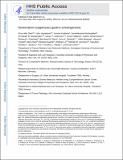Denervation suppresses gastric tumorigenesis
Author(s)
Zhao, Chun-Mei; Hayakawa, Yoku; Kodama, Yosuke; Muthupalani, Sureshkumar; Westphalen, Christoph B.; Andersen, Goran T.; Flatberg, Arnar; Johannessen, Helene; Friedman, Richard A.; Renz, Bernhard W.; Sandvik, Arne K.; Beisvag, Vidar; Tomita, Hiroyuki; Hara, Akira; Quante, Michael; Li, Zhishan; Gershon, Michael D.; Kaneko, Kazuhiro; Fox, James G.; Wang, Timothy C.; Chen, Duan; ... Show more Show less
DownloadFox_Denervation suppresses.pdf (2.233Mb)
OPEN_ACCESS_POLICY
Open Access Policy
Creative Commons Attribution-Noncommercial-Share Alike
Terms of use
Metadata
Show full item recordAbstract
The nervous system plays an important role in the regulation of epithelial homeostasis and has also been postulated to play a role in tumorigenesis. We provide evidence that proper innervation is critical at all stages of gastric tumorigenesis. In three separate mouse models of gastric cancer, surgical or pharmacological denervation of the stomach (bilateral or unilateral truncal vagotomy, or local injection of botulinum toxin type A) markedly reduced tumor incidence and progression, but only in the denervated portion of the stomach. Vagotomy or botulinum toxin type A treatment also enhanced the therapeutic effects of systemic chemotherapy and prolonged survival. Denervation-induced suppression of tumorigenesis was associated with inhibition of Wnt signaling and suppression of stem cell expansion. In gastric organoid cultures, neurons stimulated growth in a Wnt-mediated fashion through cholinergic signaling. Furthermore, pharmacological inhibition or genetic knockout of the muscarinic acetylcholine M[subscript 3] receptor suppressed gastric tumorigenesis. In gastric cancer patients, tumor stage correlated with neural density and activated Wnt signaling, whereas vagotomy reduced the risk of gastric cancer. Together, our findings suggest that vagal innervation contributes to gastric tumorigenesis via M[subscript 3] receptor–mediated Wnt signaling in the stem cells, and that denervation might represent a feasible strategy for the control of gastric cancer.
Date issued
2014-08Department
Massachusetts Institute of Technology. Department of Biological Engineering; Massachusetts Institute of Technology. Division of Comparative MedicineJournal
Science Translational Medicine
Publisher
American Association for the Advancement of Science (AAAS)
Citation
Zhao, C.-M., Y. Hayakawa, Y. Kodama, S. Muthupalani, C. B. Westphalen, G. T. Andersen, A. Flatberg, et al. “Denervation Suppresses Gastric Tumorigenesis.” Science Translational Medicine 6, no. 250 (August 20, 2014): 250ra115–250ra115.
Version: Author's final manuscript
ISSN
1946-6234
1946-6242